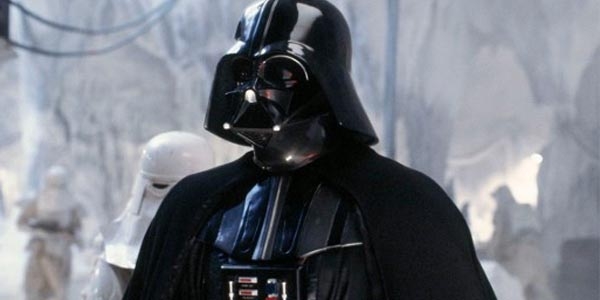2. Vader's Redemption - Return of the Jedi

After defeating Vader and completing his training, Luke realizes what's happening. The shot of him clenching a gloved fist while staring at Vader is very symbolic. The Emperor laughs, believing he has won, but Luke stares him in the eyes and proclaims, "I am a Jedi like my father before me." He knows he's inviting the Emperor to kill him. He would rather die a hero than become a villain (unintentional
Dark Knight reference). Not too pleased, the Emperor begins to electrocute Luke, torturing him before delivering the fatal blow. Helpless, Luke calls upon the only one who could save him, his father. Lucas can tinker with this scene all he wants, but there's more emotion in the original 1983 version than any alterations can forge. We can almost see through Vader's mask as he struggles between choosing saving his son or aiding his mentor. It's the ultimate character moment for him. Does he allow Anakin Skywalker to return or has he completely turned? In a move that had to have gotten applause in the theater during its original run, Vader of course picks up the Emperor and throws him over the balcony, redeeming the Jedi Knight he once was. Vader allowed his emotions to take control, but they were ones of love and compassion. In Luke, Anakin saw the man he once was; strong-willed, good-natured, and kind-hearted. He knew overpowering the Emperor would likely lead to his demise, but Vader wanted his son to live a full life. One of the main themes of
Return of the Jedi is Luke trying to save Anakin, but in the end Anakin had to save Luke. It was a nice way to bring everything full circle.
 After defeating Vader and completing his training, Luke realizes what's happening. The shot of him clenching a gloved fist while staring at Vader is very symbolic. The Emperor laughs, believing he has won, but Luke stares him in the eyes and proclaims, "I am a Jedi like my father before me." He knows he's inviting the Emperor to kill him. He would rather die a hero than become a villain (unintentional Dark Knight reference). Not too pleased, the Emperor begins to electrocute Luke, torturing him before delivering the fatal blow. Helpless, Luke calls upon the only one who could save him, his father. Lucas can tinker with this scene all he wants, but there's more emotion in the original 1983 version than any alterations can forge. We can almost see through Vader's mask as he struggles between choosing saving his son or aiding his mentor. It's the ultimate character moment for him. Does he allow Anakin Skywalker to return or has he completely turned? In a move that had to have gotten applause in the theater during its original run, Vader of course picks up the Emperor and throws him over the balcony, redeeming the Jedi Knight he once was. Vader allowed his emotions to take control, but they were ones of love and compassion. In Luke, Anakin saw the man he once was; strong-willed, good-natured, and kind-hearted. He knew overpowering the Emperor would likely lead to his demise, but Vader wanted his son to live a full life. One of the main themes of Return of the Jedi is Luke trying to save Anakin, but in the end Anakin had to save Luke. It was a nice way to bring everything full circle.
After defeating Vader and completing his training, Luke realizes what's happening. The shot of him clenching a gloved fist while staring at Vader is very symbolic. The Emperor laughs, believing he has won, but Luke stares him in the eyes and proclaims, "I am a Jedi like my father before me." He knows he's inviting the Emperor to kill him. He would rather die a hero than become a villain (unintentional Dark Knight reference). Not too pleased, the Emperor begins to electrocute Luke, torturing him before delivering the fatal blow. Helpless, Luke calls upon the only one who could save him, his father. Lucas can tinker with this scene all he wants, but there's more emotion in the original 1983 version than any alterations can forge. We can almost see through Vader's mask as he struggles between choosing saving his son or aiding his mentor. It's the ultimate character moment for him. Does he allow Anakin Skywalker to return or has he completely turned? In a move that had to have gotten applause in the theater during its original run, Vader of course picks up the Emperor and throws him over the balcony, redeeming the Jedi Knight he once was. Vader allowed his emotions to take control, but they were ones of love and compassion. In Luke, Anakin saw the man he once was; strong-willed, good-natured, and kind-hearted. He knew overpowering the Emperor would likely lead to his demise, but Vader wanted his son to live a full life. One of the main themes of Return of the Jedi is Luke trying to save Anakin, but in the end Anakin had to save Luke. It was a nice way to bring everything full circle.